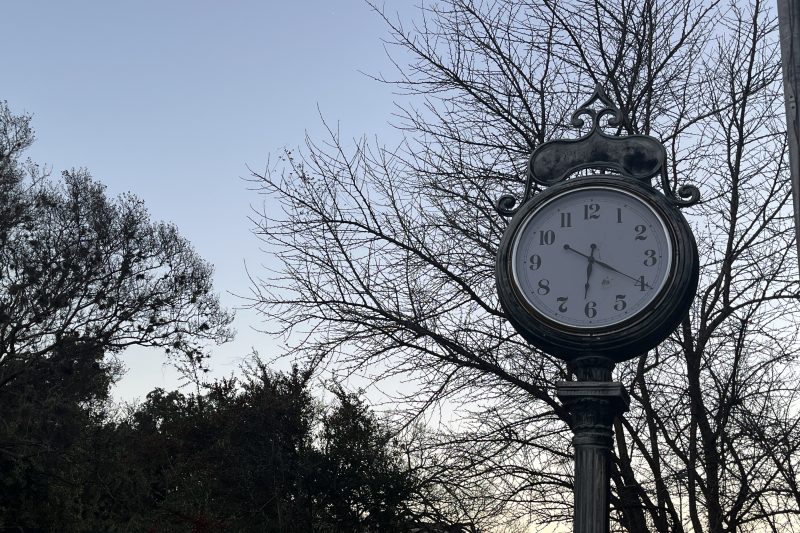Texas Lawmakers Want to Make ‘Spring Forward’ a Thing of The Past
By Grace Gates
Reporting Texas

Grace Gates/Reporting Texas
Daylight saving time rings in the summer months for 48 states, but some Texas lawmakers are working to end the historic practice of changing clocks twice a year.
In 2023, a bill proposing year-round daylight time passed overwhelmingly in the state House but stalled in the Senate. For this year’s session, lawmakers have once again filed an array of comparable legislation—but debate still lingers around when to stop the clock.
“It’s funny, because while this isn’t one of my bigger priorities, whenever I mention it, I get a lot of feedback,” Democratic State Rep. Vikki Goodwin said. “I don’t have a strong opinion about one or the other, but I would like to not have to change my clock twice a year, so let’s put it up to a vote of the people of Texas.”
Goodwin introduced a joint resolution for a state constitutional amendment that would end time changes via popular vote. If passed, Texans would get to choose daylight or standard time year-round.
“Saying that we’re going to give the voters the opportunity to choose one or the other might be a stronger message,” Goodwin said in response to the past failure of similar legislation. “There are a number of Democrats and Republicans who would support the bill.”
Time changes often cause problems for adults, according to Mistee J. Jefferies, PMHNP-BC, a psychiatrist at Paul R. Whitelock and Associates.
“People get confused easily, depression sets in even just a little bit,” Jefferies said. “It’s difficult to even lose that one hour. We see a lot of forgetfulness. People stop taking their medications in the morning.”
Jefferies said the practice sees an uptick in new patients around the beginning and end of daylight saving time.
“We call it social jet lag,” Jefferies said. “Patients just feel ‘off’ for sometimes a month or a couple of months because of the time change.”
University of Texas junior Callie Brady said she’s experienced “social jet lag” firsthand.
“When the sun sets so early, my body just shuts off. I don’t do anything,” Brady said. “It’s just depressing for the most part. Everything’s gray for a good amount of the time.”
As an avid runner, Brady said she supports Goodwin’s proposal, and, if given the chance, she would vote to keep daylight time all year, causing later sunsets.
“It really just gives more flexibility to my schedule,” Brady said. “It’s usually classes, then work and then organizations. So if it was longer, the day, then there might be time after, so that I could get in a run or do some more studying.”
Under federal law, states are only allowed to move to year-round standard time, meaning that if Texans choose daylight time, there could be federal pushback.
State Sen. Judith Zaffirini proposed a bill that would have Texas stick to standard time initially and have the opportunity to vote for daylight time if federal law changes.
“Year-round Standard Time would offer Texans greater consistency and stability, which is why it should be prioritized in the Legislature,” Zaffirini said in a statement. The senator added that her bill is “the most immediate and achievable solution.”
Zaffirini joined Rep. Will Metcalf in creating the 2023 bill for year-round daylight time. Though Zaffirini chose a new strategy for 2025, Metcalf re-filed the bill and is looking to prevent Texas from “falling back” into standard time this fall.
Zaffirini and Goodwin both said they filed their respective bills at the request of their constituents. Zaffirini said the issue’s prominence in the legislature reflects “the growing public demand for a consistent, year-round time system that provides greater stability.”
Brady insisted she would make the effort to vote in a statewide daylight saving referendum.
“It would truly would affect my day-to-day activities and what I have time for in a day,” she said.
The 2025 Texas legislative session ends on June 2. Voters will confirm approved constitutional amendments on Nov. 5.